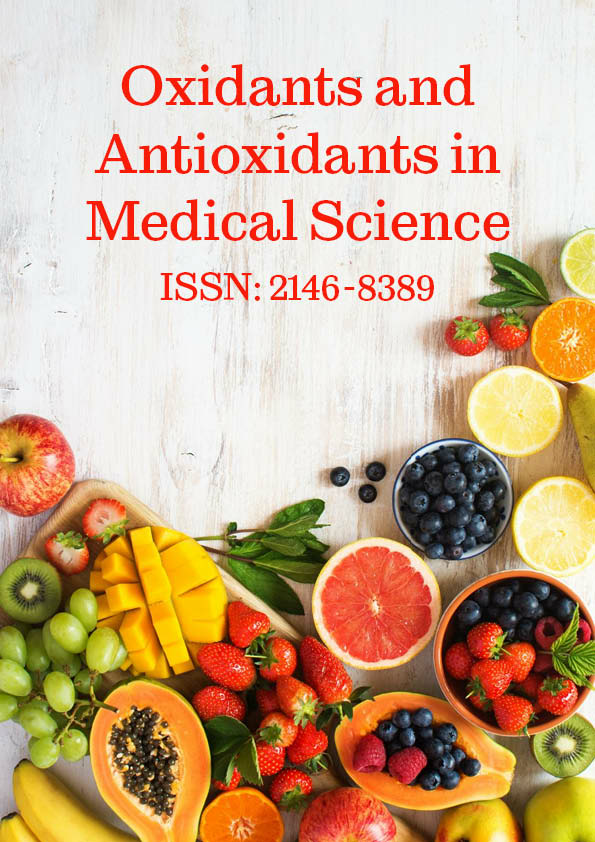Perspective - Oxidants and Antioxidants in Medical Science (2022)
The Importance of Antioxidants in the Treatment of Cancer
Mucahit Avcil*Mucahit Avcil, Department of Emergency Medicine, Adnan Menderes University, Aydan, Turkey, Email: muc.avilhit@gmail.com
Received: 01-Feb-2022, Manuscript No. EJMOAMS-22-54519; Editor assigned: 03-Feb-2022, Pre QC No. EJMOAMS-22-54519 (PQ); Reviewed: 17-Feb-2022, QC No. EJMOAMS-22-54519; Revised: 22-Feb-2022, Manuscript No. EJMOAMS-22-54519 (R); Published: 01-Mar-2022
Description
Antioxidants are often considered to be essential for good health, especially when it comes to fighting diseases such as cancer. Antioxidants and other nutrients do not interfere with chemotherapy or radiation therapy and can increase kill and increase survival. Avoid vitamin C if you’re on radiation therapy or chemotherapy. Vitamin C can interfere with these treatments and decrease their effects.
Compounds, which are present in food and are available as supplements, can play an important role in fighting free radicals. But it is not a cure-all, and some sources of antioxidants are more beneficial than others. Here’s a look at how antioxidants work, their role in preventing or treating cancer, and the best ways to supplement them.
Antioxidants can play a role in cancer prevention: Free unstable radicals can damage cell DNA in the body, which is thought to play a role in cancer development. “Our bodies produce free radicals when we breathe or exercise, and are highly susceptible to environmental toxins such as cigarette smoke, air pollution, or UV rays.” They roam the body and can cause chronic inflammation. “Antioxidants work by tracking free radicals and reducing their harmful effects. That helps keep most of the body’s cells healthy and free of cancer.
You can get your antioxidant supplement in the diet: The body makes its own antioxidants to fight free radicals, and you can get a lot out of eating healthy foods. Brightly coloured fruits and vegetables, such as tomatoes, carrots, spinach, broccoli, sweet potatoes, strawberries, and citrus fruits, are excellent sources. Whole grains, nuts, seeds, and wheat germ provide antioxidants as well. Your best bet goes to a lot of variety, as different foods have different antioxidants.
Antioxidant supplements are probably not suitable: When antioxidants come from a healthy diet, it is easy to assume that high antioxidant ingredients are even better. But there is no evidence that antioxidant ingredients can prevent cancer or other diseases. In fact, high doses of certain antioxidants may actually increase the risk of other cancers. Another thing to consider is supplements contain unique types of antioxidants, but not so with diet. “Foods will be rich in antioxidants and phytonutrients, vitamins, minerals, and fiber”. It is possible that all of these compounds work together to produce their own anti-inflammatory effects.
If you are facing cancer, it’s important to focus on good nutrition overall: Taking antioxidant supplements during cancer treatment does not appear to have any beneficial effects and studies have shown that, in some cases, it can lead to more serious side effects. It is not a bad idea to focus on getting antioxidants from fruits and vegetables, including if you have cancer. But do not stress too much. It can be difficult to eat during cancer treatment, getting into any kind of calories is the most important thing in maintaining your weight.
You should talk to your doctor if you are taking antioxidant supplements or are considering trying one: The supplements have not been shown to protect against cancer, and they have the potential to interact with other medications that you may be taking or that may have a negative effect on cancer treatment.
Copyright: ©2022 The Authors. This is an open access aricle under the terms of the Creaive Commons Atribuion NonCommercial ShareAlike 4.0 (https://creativecommons.org/licenses/by-nc-sa/4.0/). This is an open access article distributed under the terms of the Creative Commons Attribution License, which permits unrestricted use, distribution, and reproduction in any medium, provided the original work is properly cited.







